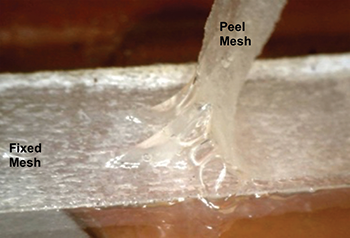For coughing up phlegm, water is key
To thin out dry, sticky lung mucus, just add water

Coughing up mucus after a cold or flu is gross, but it’s also a sign your body is doing its job.
AaronAmat/iStockphoto
Most people are familiar with phlegm. It’s the gunk you might cough up when you have a cold or the flu. This mucus is not pretty. But as long as it keeps moving, it does a body good. With certain diseases, though, phlegm becomes too thick to be easily cleared. It can end up clogging the lungs, making it hard to get oxygen in and out. In some diseases, such as cystic fibrosis, people risk suffocating from a phlegm overload. The question has been why their mucus sticks so firmly to their lungs. A new study finds that it all comes down to water.
The new data might help doctors better gauge which treatments work, and what new medicines might help patients breathe more freely.
“We wanted to know how mucus is cleared by cough,” says Brian Button. He studies biophysics — the physics of living things — at the University of North Carolina in Chapel Hill. Phlegm gunks up the lungs in two ways. The first is adhesion, the tendency of mucus to stick to the surface of the lungs. The second is cohesion, the tendency of mucus to stick to itself.
To measure these things, Button uses a device called a peel tester. It gauges how sticky something is by measuring how much force it takes to peel it off a surface. Normal peel testers are designed for products like tape. Button and his colleagues had to invent a new type for phlegm.

Next, they had to collect a lot of mucus. They got some samples from living patients. But they also got some from donated lung tissue. Some came from healthy patients who had donated their organs to science after death. Others came from people with cystic fibrosis or other lung diseases who had received a lung transplant (leaving their unhealthy tissue available for science).
From those donor lungs, Button says, “We scrape off the airway cells and grow them [up in a dish].” As the lung cells multiply, they make mucus. They even wave their tiny cilia around, pushing the mucus in slow circles. In a way, his team became “mucus farmers,” Button says.
The mucus in the lungs of people with cystic fibrosis is especially gloppy. But scientists did not know how this viscous stuff interacted with the lungs, or what would help a patient cough it up. Some researchers thought they could thin out mucus by making it more acidic — like lemon juice.
Button’s team thought maybe the thick mucus was just too dry. Normal mucus is 98 percent water. In people with cystic fibrosis, that mucus is only 79 percent water. Using the peel tester, the team showed that the force of a cough could easily tear normal phlegm off a surface. But at 79 percent water, mucus clung too tightly. A cough would not be strong enough to propel it out of the lung’s tiny airways.
The more watery a mucus, the more easily it tore away. And when Button and his colleagues added water to samples from patients with cystic fibrosis, their mucus now peeled away just fine.
These researchers shared their findings in the December 4, 2018 issue of the Proceedings of the National Academy of Sciences.
Just add water?
“There are so many people we could help if we could figure out how to make their mucus thinner,” says Stephanie Christenson. She’s a pulmonologist, or lung expert, at the University of California, San Francisco. What she finds especially cool about the new mucus study: “They were looking … at not just what it looks like, but how it interacts with the airways and the body.”

Drinking more water won’t solve the problem. But there is already one method to make phlegm a little more watery. Patients can inhale concentrated salt through a device called a nebulizer (NEH-beu-lye-zur). Salt in the lungs yanks water out of the blood and delivers it to the dry mucus. The wetter mucus can then get hacked out. Now, Button notes, scientists understand just why the nebulizer works so well.
But its effects don’t last long. “As soon as it’s turned off, all the fluid is reabsorbed,” Button says.
Button’s group is now exploring ways to make fluid stick around to keep the phlegm flowing. They also are looking into other treatments that might break up mucus chains or make thick mucus more slippery.







